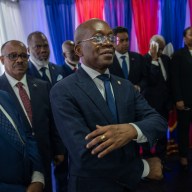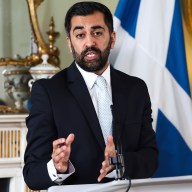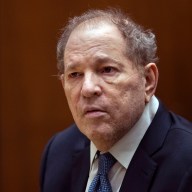OTTAWA – Only in the national capital can a confounding debate start with two essentially identical statements.
“Let me begin by telling Canadians that the Liberal party is not seeking an election,” Liberal Leader Michael Ignatieff said Monday morning to open a day, if not a week, of pure political theatre.
Just less than five hours later, Prime Minister Stephen Harper took to the same podium to express the same sentiment – a follow-the-leader routine unprecedented in the Conservative communications playbook.
“Mr. Ignatieff said he doesn’t want an election,” Harper told the news conference, hastily arranged across the street from Parliament Hill just after the daily Commons question period.
“I don’t want an election,” continued the prime minister. “I don’t think anybody wants an election. I don’t think anybody in Canada wants or expects an election.”
In between Ignatieff and Harper’s apparently sincere anti-election rhetoric lies a whole field of black and grey.
Think of it as a chess board in which only the opening pawns have been played.
“Let’s just keep this serene and calm and businesslike,” said Ignatieff, even as he held out the threat of defeating the minority Conservatives on a spending bill scheduled for Friday that would plunge Canada into its first July federal election since 1974.
On the surface, the issue of the season for the prime minister and the leader of the official Opposition is stimulating the depressed economy and improving the Employment Insurance system for Canadians hard hit by the downturn.
Ignatieff tossed in the government’s handling of the medical isotope crisis for good measure.
But the Liberal leader, in laying down the threat of government defeat, was careful not to place too much emphasis on policy prescriptives.
The day seemed designed more to define character than legislation.
“I’m seeking co-operation, not confrontation,” said Ignatieff, noting his proposal to change the EI qualification period is open to negotiation.
“I think reasonable people can find reasonable ground. That’s what co-operation means in politics.”
He also pointedly refused to characterize his threat to vote against the government this Friday as an ultimatum.
“You used the word preconditions or conditions – I did not,” Ignatieff corrected a questioner at one point.
The apparently fuzzy nature of the Liberal demands prompted Harper to get off the day’s best line.
“It’s very difficult to respond to an ultimatum without responding with another one,” Harper said in French, before switching to English to finish the thought.
“Usually you say, ‘Do X, or else.’ You don’t just say, ‘Or else.”‘
It brought laughter from the assembled parliamentary press gallery members, but it said as much about the prime minister as it did about Ignatieff.
The Liberal leader repeated again and again his desire for dialogue and co-operation, an apparent bid to play on opinion polls that show Harper is locking in a reputation as a belligerent, bare-knuckle partisan.
And rather than give the government a chance to respond to his co-operation-seeking wish-list, Ignatieff essentially ignored his morning demands during the afternoon question period in the House.
The Liberal tactic worked, inasmuch as it prompted the prime minister to hold a rare and unscheduled press theatre appearance.
“Frankly, I expected questions from Mr. Ignatieff during question period,” Harper explained. “So I’m here to answer your questions.”
A prime minister well known for his sharp elbows then proceeded to match Ignatieff note-for-note in calmness and reasonability.
He firmly shot down the Liberal proposal for Employment Insurance changes but then slightly fleshed out his own cryptic promises for Tory reforms – saying they will deal with an opt-in model for self-employed workers who are currently shut out of the system.
Harper also said he’d welcome a sit-down with the Opposition leader – a first since January – to discuss the economy. Late in the day the Prime Minister’s Office said an invitation had been offered to Ignatieff to meet Tuesday.
The combined leaders’ performances left the cynical and paranoid parliamentary press corps no more or less convinced that a snap election could come on Friday.
“I think we made a little progress today,” Ignatieff told CBC Newsworld late in the afternoon.
















